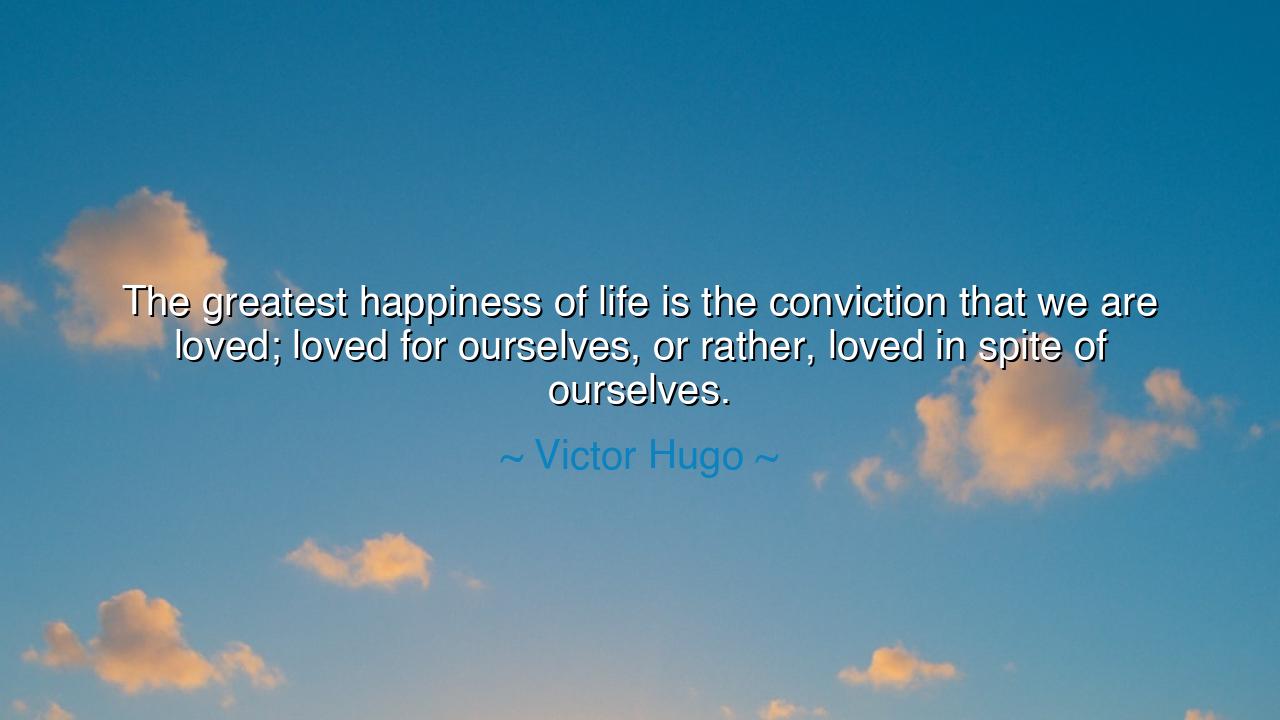
The greatest happiness of life is the conviction that we are
The greatest happiness of life is the conviction that we are loved; loved for ourselves, or rather, loved in spite of ourselves.






The immortal Victor Hugo, whose pen carved light from the darkness of the human soul, once wrote: “The greatest happiness of life is the conviction that we are loved; loved for ourselves, or rather, loved in spite of ourselves.” In these words, he revealed one of the deepest truths ever spoken about the human heart — that love, in its purest form, is not a reward for perfection but a grace that endures imperfection. True happiness, he tells us, is not found in wealth, power, or fame, but in knowing that even with our flaws, our failures, and our wounds, there exists another soul who sees us — and loves us still.
To understand this quote, we must see through the eyes of Hugo himself — a man who knew both glory and heartbreak. As the author of Les Misérables and The Hunchback of Notre-Dame, he explored the grandeur and tragedy of the human condition. He saw the saint within the sinner, the beauty within the broken, and the goodness that survives even in despair. When he spoke of being loved in spite of ourselves, he was speaking of a love that transcends judgment — a love that, like divine mercy, recognizes our weaknesses and embraces us not because we are perfect, but because we are human. Such love does not blind itself to fault; it sees clearly, and loves anyway.
This kind of love is rare and sacred. It is not the infatuation of youth or the admiration born of success. It is the steady flame that burns when the mask is lifted, when pride is humbled, when the soul stands bare. To be loved for ourselves means to be seen — to have another behold our darkness and light, our contradictions, our fears — and still say, “You are enough.” Hugo’s wisdom reminds us that this love is what every heart hungers for: not the applause of the crowd, but the quiet acceptance of one who knows us completely. It is in this knowledge that the soul finds peace, and happiness takes root like a tree nourished by unconditional light.
History, too, has shown us the transformative power of such love. Consider the story of Jean Valjean, the central figure of Hugo’s Les Misérables — a man hardened by injustice, who finds redemption not through punishment, but through compassion. When the Bishop forgives him for stealing and gives him his silver, saying, “I have bought your soul for God,” Valjean is overcome. It is this act — this moment of being loved in spite of himself — that awakens his humanity and changes the course of his life. Through him, Hugo teaches us that love has the power to resurrect what despair has killed. Forgiveness, mercy, and acceptance are the highest forms of love, and in receiving them, one finds the greatest happiness of life.
And yet, this truth is not confined to fiction. It lives in the quiet corners of the world — in the mother who forgives her wayward child, in the friend who stays when others leave, in the partner who sees both the beauty and the scars and cherishes them equally. Such love gives life meaning because it assures us that we are more than our mistakes. To be loved in spite of ourselves is to be reminded that our worth does not vanish with failure, nor our beauty fade with imperfection. It is to know that even when we fall, someone still believes in the light within us.
But, my child, such love does not come easily. It requires courage — both to give and to receive. To love another in spite of their flaws demands compassion; to accept love in spite of our own flaws demands humility. We often hide behind walls, fearing that if we are truly known, we will be rejected. Yet Hugo’s words call us to tear down those walls, to let ourselves be seen as we are. Only when we risk vulnerability can we experience the fullness of love — the kind that heals rather than flatters, that deepens rather than fades.
So, remember this sacred teaching: seek not to be loved for what you seem, but for what you are, and strive to love others in the same way. The truest love does not say, “I love you because you are perfect,” but “I love you though you are imperfect — and perhaps because you are.” When you find such love — cherish it, nurture it, return it. For as Victor Hugo taught, all other joys in life are but shadows compared to the radiance of knowing that you are truly, deeply, and unconditionally loved — in spite of yourself.






AAdministratorAdministrator
Welcome, honored guests. Please leave a comment, we will respond soon